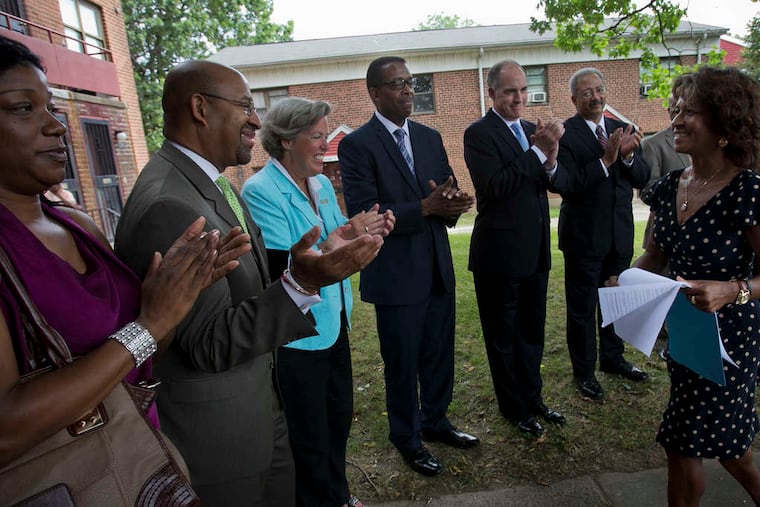U.S. gives $30 million for N. Phila. housing
A distressed and impoverished swath of North Philadelphia near Temple University will be getting $30 million from the federal government to improve housing and develop vacant lots.

A distressed and impoverished swath of North Philadelphia near Temple University will be getting $30 million from the federal government to improve housing and develop vacant lots.
Much of the "Choice Neighborhoods" grant from the U.S. Department of Housing and Urban Development will be used to replace Norris Apartments, a 1950s-era public housing facility, and build 297 units of affordable and market-rate housing throughout the neighborhood.
Both the city's Office of Housing and Community Development (and the Philadelphia Housing Authority applied for the grant. An additional $125 million for the project is expected to come from city, state, and private sources over time, HUD officials said.
On the site of the Norris Apartments, PHA will help develop a mixed-income rental apartment complex, much like the Paseo Verde complex on North Ninth Street, officials said.
"This is truly a spectacular day," Mayor Nutter said during an outdoor news conference at Norris Apartments. He acknowledged the startled and amused residents looking on, adding, "This is about you."
He added that some parts of the community have poverty rates of around 60 percent, more than double the overall city rate of nearly 27 percent.
Quoting President Obama, HUD official Jemine Bryon presented the $30 million grant by saying that the message of Choice Neighborhoods is that "no child should have her future determined by her zip code." Bryon is the acting assistant secretary for public and Indian housing.
U.S. Sen. Robert P. Casey (D., Pa.) said the grant is not a "one-size-fits-all" plan from Washington. It's up to Philadelphia to develop the strategy for the best use of the funding, he said.
"This is about the people, and celebrating their future," he said.
U.S. Rep. Chaka Fattah (D., Pa.) credited Casey for helping steer the grant to Philadelphia.
"He was the point guard" on the project, Fattah said, adding that the grant "will improve the life chances for thousands of Philadelphians."
Officials also gave credit to Donna Richardson, president of the Norris Apartments Tenant Council, who represents neighbors in the area. She, in turn, said it was the residents who inspired her to work with officials to obtain the grant for her area.
"The residents here just want to come out of their doors and be proud of their neighborhood," she said.
That isn't always easy.
"There are lots of shootings here," said Norris Apartments resident Niya Brown, 26, a mother of two children, ages 11 and 2. "And there aren't a lot of activities for children."
With some of the grant money earmarked for community development, Brown hopes to start a double Dutch jump-rope team.
After the news conference, officials toured the neighborhood and noted its "gap-toothed" look - created by a plethora of empty lots that officials promise will soon be filled with homes.
Kenneth Lawrence Jr., Temple's senior vice president for government, community and public affairs, said the school was "very excited" about the grant. Temple is committing $1 million in cash and in-kind resources to create educational programs in the neighborhood, he said.
The school will focus on programs for neighborhood children in public housing, including those attending Dunbar and Duckrey Schools, Lawrence said. Temple also will hire an educational engagement coordinator, and create a pre-K and after-school program for neighborhood children, and a college and career-readiness program for children attending Benjamin Franklin High School.
Work on the project is scheduled to begin in six to nine months, and is expected to take five years.
During that time, Norris Apartments residents may have to relocate as they await new construction, officials said, adding that no one would be asked to leave the neighborhood.
Along with the city housing office and PHA, Temple and the nonprofit Asociacion de Puertorriquenos en Marcha (which developed Paseo Verde) worked closely with neighbors to develop a blueprint for revitalizing the neighborhood.
Acknowledging the work of so many sources to bring the grant to the area, Bryon said, "All of us have to pull together for the citizens. It's a challenge, but we see it as a holistic solution."